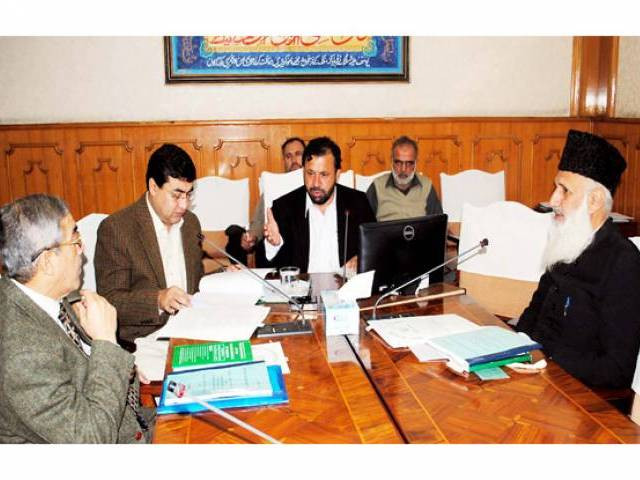Resource distribution: Instead of updating NFC Award, govt opts for ad hoc extensions
Smaller provinces protest against delay in recently held NFC meeting

K-P Finance minister Muzaffar presiding over a meeting regarding NFC at Civil Secretariat
PHOTO: EXPRESS
As per Article 160 of the Constitution, the president will establish the National Finance Commission after every five years. The commission will review the formula for sharing taxes, funds and other financial resources among the four federating units namely, Punjab, Sindh, Balochistan and Khyber-Pakhtunkhwa (K-P) as well as with the centre.
In the current seventh NFC Award, 42.5% of the divisible pool of taxes is given to the central government. From the remaining 57.5%, Punjab gets 51.74%, Sindh 24.55%, K-P 14.62% and Balochistan 9.09%.
Keeping in view the level of poverty and backwardness in the provinces, except for Punjab, these ratios do not appear reasonable. Under the NFC formula, Punjab takes the largest share regardless of the fact that Sindh contributes nearly 70% to the total income of the country.
If the calculation is made on the basis of revenue, the share of Punjab comes in at 23.04% whereas Sindh’s share stands at 69.02%. This is what makes the NFC Award a touchy issue between the centre and provinces as well as among provinces. Thus, this is hurting inter-provincial harmony.
According to the seventh NFC Award announced by the Pakistan Peoples Party (PPP) government in 2009, the share of centre and provinces was fixed, which as per the principle practiced before the 1996 Award should have been 20% and 80%, respectively.
The distribution of the present NFC Award is based on multiple criteria, but unfortunately, 82% of the distribution is still based on population whereas the share for backwardness, poverty and revenue collection is 5%, 10.3% and 2.7%, respectively.
This reveals that the distribution of resources among provinces is not acceptable. According to the 18th Amendment, the share of provinces could be increased, but cannot be decreased from the share fixed in the seventh NFC Award.
Economists expecting to be part of a cure-all technocratic set-up are pointing fingers at what they view as the wasteful seventh NFC award. This award was termed historic because the provincial share in the divisible pool was made larger than the share of the federal government for the first time.
In addition to an 11-percentage-point decline in its share, the federal government was also required to address any shortfall in the projected share of Balochistan.
Moreover, before applying the new formula to the divisible pool, 1% of proceeds would be deducted and allocated to K-P to meet expenses of the war on terror. Federal revenues were also affected by the devolution of general sales tax collection on services to the provinces.
The seventh NFC Award was a hard-won consensus to address the long-standing concerns of provinces. It was also necessary to enable provinces to bear the burden of devolution under the 18th Amendment.
Most notably, the award shifted criteria of the distribution of resources between provinces from population to multiple indicators in order to promote inter-provincial harmony.
After the 18th Amendment, the NFC Award has become more crucial because provinces need to adequately fund important services like education and health. However, the present government has cut a sorry figure in doing the needful.
Instead of updating the award, it has resorted to ad hoc extensions. Smaller provinces protested the delay in the recently held NFC meeting. It is startling that the NFC Award was not discussed even once during 18 meetings of the Council of Common Interests held over the last 10 years.
Differences among provinces persist when it comes to the ownership of natural resources and royalty distribution. Natural resources, of course, are a blessing for the people living in those areas. But, unfortunately, this has not been the case in Pakistan.
Balochistan and Sindh feel deprived and discriminated in the ownership of natural resources. For example, Sindh contributes 71% to the total gas production in Pakistan, whereas the share of Balochistan, Punjab and K-P is 22%, 5% and 2%, respectively.
The share of Sindh, Balochistan, Punjab and K-P in oil production is 56%, 25%, 1% and 18%, respectively.
The centre had been taking away 88.5% of the royalty on natural resources before the 18th Amendment. The provinces used to receive only 11.5%, which was further affected by red tape and corruption.
After the amendment, the subject of natural resources was devolved to the provinces and the share of royalty on natural resources increased from 11.5% to 50%. However, it still awaits implementation.
The writer is a researcher at the Sustainable Development Policy Institute
Published in The Express Tribune, April 16th, 2018.
Like Business on Facebook, follow @TribuneBiz on Twitter to stay informed and join in the conversation.



















COMMENTS
Comments are moderated and generally will be posted if they are on-topic and not abusive.
For more information, please see our Comments FAQ